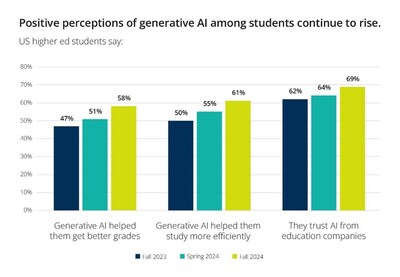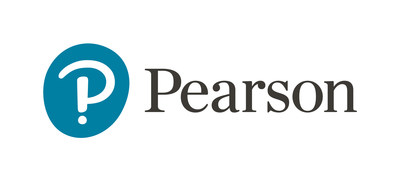End of Year AI Report: More higher ed students embrace AI for active learning; educators see instructional opportunities
Pearson (PSON.L) released new insights showing increased AI adoption in higher education. Students using Pearson's AI tools are 4x more likely to engage in active studying, with an 11-percentage-point increase in students reporting better grades and study efficiency. Usage data reveals that students using AI-generated flashcards were nearly 3x more likely to return and practice.
The analysis shows 38% of student inputs demonstrate higher cognitive complexity, while 25% involved critical thinking skills. AI sessions in MyLab and Mastering increased 95% from fall 2023 to 2024. Faculty adoption is also growing, with 77% of surveyed educators envisioning AI integration in teaching methods, particularly for generating examples, providing tutoring services, and developing instructional content.
Pearson (PSON.L) ha pubblicato nuove informazioni che mostrano un aumento dell'adozione dell'IA nell'istruzione superiore. Gli studenti che utilizzano gli strumenti di IA di Pearson hanno 4 volte più probabilità di impegnarsi in uno studio attivo, con un incremento di 11 punti percentuali negli studenti che segnalano voti e efficienza nello studio migliori. I dati di utilizzo rivelano che gli studenti che usano le flashcard generate dall'IA erano quasi 3 volte più propensi a tornare e praticare.
L'analisi mostra che il 38% degli input degli studenti dimostra una maggiore complessità cognitiva, mentre il 25% coinvolge abilità di pensiero critico. Le sessioni di IA in MyLab e Mastering sono aumentate del 95% dall'autunno 2023 al 2024. Anche l'adozione da parte dei docenti sta crescendo, con il 77% degli educatori intervistati che prevedono l'integrazione dell'IA nei metodi di insegnamento, in particolare per generare esempi, fornire servizi di tutoraggio e sviluppare contenuti didattici.
Pearson (PSON.L) ha publicado nuevos datos que muestran un aumento en la adopción de IA en la educación superior. Los estudiantes que utilizan las herramientas de IA de Pearson tienen 4 veces más probabilidades de participar en un estudio activo, con un aumento de 11 puntos porcentuales en el número de estudiantes que informan mejores calificaciones y eficiencia en el estudio. Los datos de uso revelan que los estudiantes que utilizan tarjetas de estudio generadas por IA son casi 3 veces más propensos a regresar y practicar.
El análisis muestra que el 38% de las entradas de los estudiantes demuestra una mayor complejidad cognitiva, mientras que el 25% involucra habilidades de pensamiento crítico. Las sesiones de IA en MyLab y Mastering aumentaron 95% desde el otoño de 2023 hasta 2024. La adopción por parte de los docentes también está creciendo, con el 77% de los educadores encuestados que prevén la integración de la IA en los métodos de enseñanza, especialmente para generar ejemplos, proporcionar servicios de tutoría y desarrollar contenido instructivo.
피어슨 (PSON.L)은 고등 교육에서 인공지능(AI) 채택 증가를 보여주는 새로운 통찰을 발표했습니다. 피어슨의 AI 도구를 사용하는 학생들은 4배 더 능동적으로 학습에 참여할 가능성이 있으며, 더 나은 성적 및 학습 효율성을 보고하는 학생의 비율이 11% 증가했습니다. 사용 데이터에 따르면 AI로 생성된 플래시 카드 사용 학생들은 거의 3배 더 복습하고 연습할 가능성이 높았습니다.
분석 결과에 따르면 학생 입력의 38%가 높은 인지 복잡성을 보여주며, 25%는 비판적 사고 능력을 포함하고 있습니다. MyLab과 Mastering에서의 AI 세션은 2023년 가을부터 2024년까지 95% 증가했습니다. 교수진의 채택도 증가하고 있으며, 77%의 응답 교육자들이 교육 방법에 AI 통합을 구상하고 있으며, 특히 예제 생성, 튜터링 서비스 제공 및 교육 콘텐츠 개발을 위해서입니다.
Pearson (PSON.L) a publié de nouvelles informations montrant une adoption accrue de l'IA dans l'enseignement supérieur. Les étudiants utilisant les outils d'IA de Pearson sont 4 fois plus susceptibles de s'engager dans un apprentissage actif, avec une augmentation de 11 points de pourcentage des étudiants signalant de meilleures notes et une efficacité d'étude accrue. Les données d'utilisation révèlent que les étudiants utilisant des cartes mémoire générées par IA étaient presque 3 fois plus susceptibles de revenir et de pratiquer.
L'analyse montre que 38% des contributions des étudiants démontrent une plus grande complexité cognitive, tandis que 25% impliquent des compétences de pensée critique. Les sessions d'IA dans MyLab et Mastering ont augmenté de 95% de l'automne 2023 à 2024. L'adoption par les enseignants est également en croissance, avec 77% des éducateurs interrogés envisageant une intégration de l'IA dans les méthodes d'enseignement, notamment pour générer des exemples, fournir des services de tutorat et développer des contenus pédagogiques.
Pearson (PSON.L) hat neue Erkenntnisse veröffentlicht, die eine zunehmende Nutzung von KI in der Hochschulbildung zeigen. Studierende, die die KI-Tools von Pearson verwenden, haben 4-mal höhere Chancen, aktiv zu lernen, wobei ein Anstieg von 11 Prozentpunkten bei den Studierenden verzeichnet wurde, die von besseren Noten und Lernfortschritten berichten. Nutzungsdaten zeigen, dass Studierende, die KI-generierte Lernkarten verwenden, fast 3-mal wahrscheinlicher zurückkehren und üben.
Die Analyse zeigt, dass 38% der Eingaben der Studierenden eine höhere kognitive Komplexität aufweisen, während 25% kritische Denkfähigkeiten beinhalten. Die KI-Sitzungen in MyLab und Mastering stiegen von Herbst 2023 bis 2024 um 95%. Auch die Akzeptanz bei den Dozenten wächst, wobei 77% der befragten Lehrkräfte eine Integration von KI in die Lehrmethoden in Erwägung ziehen, insbesondere zur Erstellung von Beispielen, dem Angebot von Nachhilfe und der Entwicklung von Lehrmaterialien.
- AI study tools users 4x more likely to engage in active studying
- 95% increase in AI sessions from fall 2023 to 2024
- 77% of faculty members plan to integrate AI in teaching methods
- 38% of student inputs show higher cognitive complexity
- AI-generated flashcard users show 3x higher engagement rates
- None.
Insights
The latest AI usage data from Pearson reveals significant growth in student engagement and faculty adoption, strengthening the company's digital transformation strategy. With 95% growth in AI sessions and 4x higher active studying rates, these metrics validate Pearson's AI investment thesis. The company's digital penetration now exceeds 80% of products, positioning it well in the evolving edtech market.
The expansion to over 350 eTextbook titles and 100 MyLab titles with AI features demonstrates strong product scaling. Faculty interest at 77% suggests potential for sustained revenue growth from institutional adoption. This digital-first approach, backed by concrete usage data and positive learning outcomes, could drive higher-margin recurring revenue streams and market share gains in the competitive higher education sector.
Pearson's AI implementation shows promising signs of driving meaningful educational outcomes. The 38% rate of higher-level cognitive engagement and 25% critical thinking application in Biology courses indicates the AI tools are delivering on pedagogical objectives. The 3x increase in practice engagement with AI-generated flashcards is particularly significant, as sustained practice is important for learning retention.
The robust adoption metrics across both students and faculty suggest Pearson's AI features are hitting the sweet spot between technological innovation and practical utility. The focus on active learning through AI-powered tools positions Pearson ahead of competitors in the critical area of learning effectiveness, which could become a key differentiator as the edtech market matures and institutions become more selective about digital learning solutions.
- Higher ed students using Pearson AI tools are 4x as likely to engage in active and efficient studying
- More students report AI is helping them get better grades and study more efficiently
77% of faculty envision using AI to enhance teaching methods, including AI-based tutoring and instructional content
Pearson, in partnership with Morning Consult, conducted its third consecutive semester surveying US college students to track their evolving use and perception of AI. The survey of more than 1,000 students shows an 11-percentage-point increase in students reporting that AI has helped them get better grades and study more efficiently.
Pearson user data shows AI tools promote active and efficient studying
This fall, Pearson learning science researchers analyzed student study behavior in eTextbooks with embedded AI study tools from fall '23 through spring '24. The analysis showed many students advancing from passive to active study, which fosters better retention of information and is associated with a deeper understanding of concepts. Active study behaviors include notetaking, self-testing and spaced practice, rather than behaviors like memorization and cramming, which are characteristic of passive studying.
Key insights from the fall 2024 usage trends include:
- More Active Studying: Students using AI study tools were 4x as likely to remain or become active, efficient studiers compared to those who did not use the AI study tools.
- Advanced Learning:
38% of student inputs to the AI explain study tool in Campbell Biology show students engaging at a higher level of cognitive complexity, such as applying, analyzing or evaluating information. - Higher-Order and Critical Thinking:
25% of student inputs to the AI explain study tool in Campbell Biology specifically involved analysis or evaluation associated with critical thinking skills.
In addition, Pearson usage data shows students who used AI-generated flashcards in their eTextbook were nearly three times more likely to return and practice than students without AI-generated flashcards, indicating high engagement.
In Pearson's MyLab and Mastering study platform, AI sessions increased
"This data underscores the importance of active learning, and the role AI can play in enhancing student engagement," said Emily Lai, vice president of learning impact measurement. "We employ learning science principles to create features that promote active learning to help students succeed and develop skills for their academic and professional lives. We are excited to see AI making quality learning easier for today's busy students."
Faculty see opportunity for AI implementation
Higher education faculty are increasingly seeing the potential of AI in the classroom. According to a Pearson survey conducted with Intertwine Insights,
Top ways faculty are interested in using AI:
- Generating additional examples and sourcing materials to enrich lessons (
41% ). - Providing AI-based tutoring services to assist students with challenging concepts (
40% ). - Developing instructional content to make lesson planning more efficient (
39% ). - Creating AI-generated study tools such as outlines, flashcards, practice tests and study guides (
35% ).
This growing interest in AI by faculty complements the positive student data, highlighting a broader trend of AI integration in education.
More than two million US higher education students currently have access to AI study tools in more than 100 MyLab and Mastering titles and nearly 350 eTextbook titles, with many titles featuring AI in global editions. Thousands of US educators also have access to AI instructor tools in nearly 60 MyLab and Mastering titles that allow them to efficiently create customized assignments for their students. The availability of these features to students and educators marks Pearson's commitment to learning experiences with AI features for studying, learning and instruction.
Pearson's application of generative AI is part of a product development process that is driven by learning science and subject matter experts. With more than
To learn more, read the Pearson 2024 End of Year AI Report for Higher Education.
About Pearson
At Pearson, our purpose is simple: to help people realize the life they imagine through learning. We believe that every learning opportunity is a chance for a personal breakthrough. That's why our c. 18,000 Pearson employees are committed to creating vibrant and enriching learning experiences designed for real-life impact. We are the world's lifelong learning company, serving customers in nearly 200 countries with digital content, assessments, qualifications, and data. For us, learning isn't just what we do. It's who we are. Visit us at pearsonplc.com.
Media Contact:
Sami Miller, Sami.Miller@Pearson.com
![]() View original content to download multimedia:https://www.prnewswire.com/news-releases/end-of-year-ai-report-more-higher-ed-students-embrace-ai-for-active-learning-educators-see-instructional-opportunities-302330254.html
View original content to download multimedia:https://www.prnewswire.com/news-releases/end-of-year-ai-report-more-higher-ed-students-embrace-ai-for-active-learning-educators-see-instructional-opportunities-302330254.html
SOURCE Pearson









